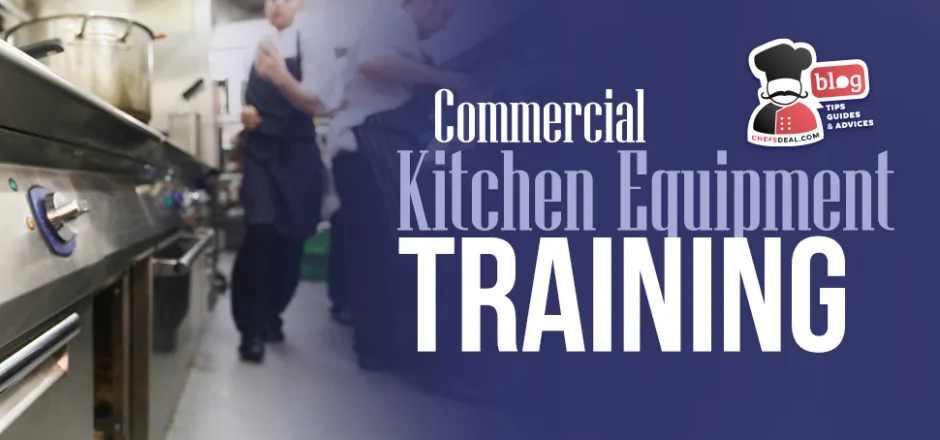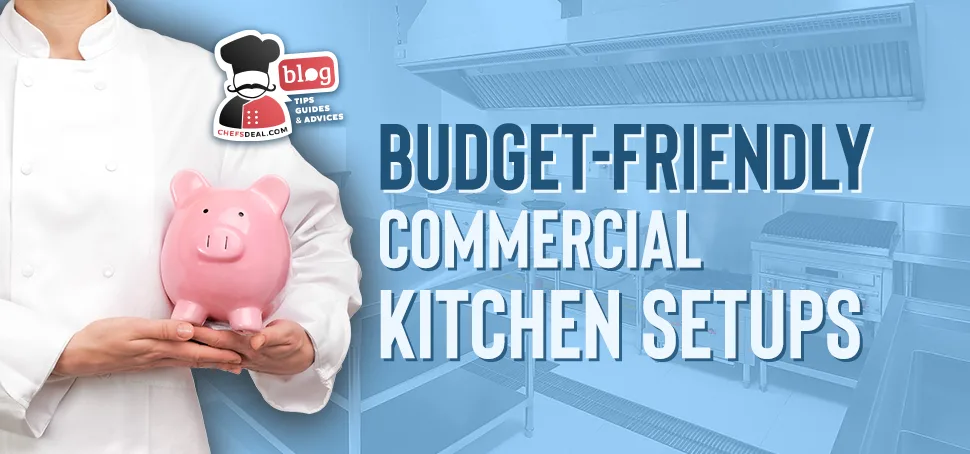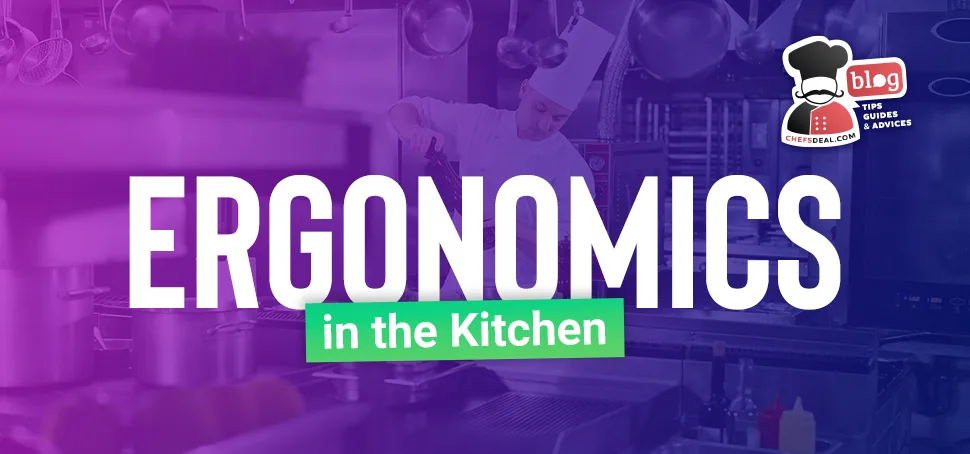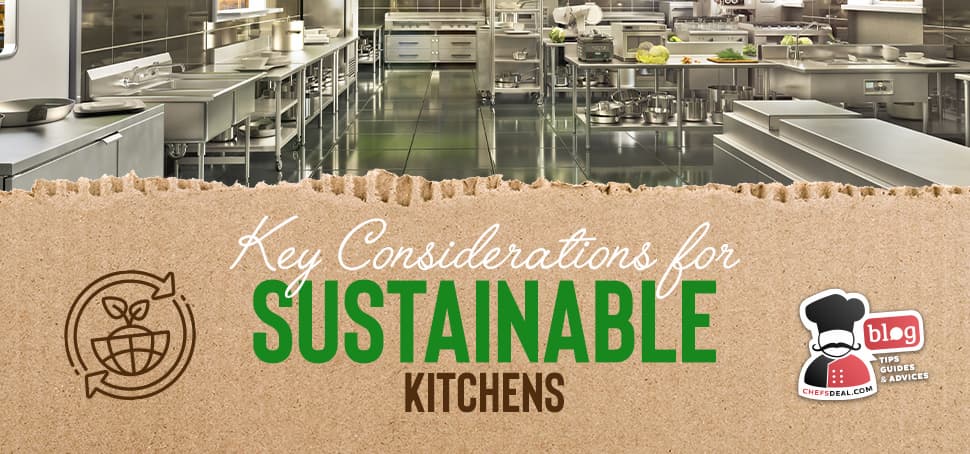Every foodservice establishment must have a well-planned commercial kitchen equipment training system for its staff to ensure maximum benefit, longest life, and most efficient service. The success of a foodservice business is a combination of expertise, creativity, efficiency, and innovation, as well as how tasty your menu items are, each of which has its applications in commercial kitchens. But their common point is always the commercial kitchen equipment, which is designed and produced for specific conditions, such as preparing and cooking in large volumes, consistent taste and texture, quicker service and cleaning in foodservice establishments.
Therefore, the importance of commercial kitchen equipment training cannot be overstated, as it directly impacts kitchen safety, operational efficiency, and the overall success of culinary endeavors.
Start with the Foundations: Introducing the Basic Commercial Kitchen Equipment and Safety Protocols
Commercial kitchen equipment training starts with foundational issues of all commercial foodservice businesses. Therefore, food and health safety are the principal things you should start with and introduce to your staff. Foods and ingredients need to be fresh and preserved in accordance with their preservation requirements to save you a great amount of money by preventing food waste while bringing you higher profits by enabling you to make the tastiest foods for your patrons.
Food handling is significant to prevent cross-contamination, and restaurant café staff needs to be equipped with basic knowledge on how to use gloves and aprons while touching food or preparing the necessary ingredients.
Safety concerns, warnings, and precautions for staff health are also important parts of commercial kitchen equipment training since these restaurant tools and appliances generally produce higher heat or cold than residential units. Thus, all your staff must have prior knowledge of potential risks before starting in-depth training about these units.
Going Beyond Basics: In-Depth and Comprehensive Training
After covering vital issues to ensure a safe and healthy operation, you can continue with in-depth and comprehensive commercial kitchen equipment training, primarily about functions and operational details such as launching, setting, maintaining, and cleaning.
In-Depth Exploration of Equipment Functionality
Commercial kitchen equipment manufacturers continuously work on new technologies, techniques, and ways of improving efficiency, effectiveness, food storage, preparation, and cooking, and they offer new units with state-of-the-art features. However, utilizing these features can only be achieved through having well-structured commercial kitchen equipment training about their features, technologies, and how to harness these.
Comprehensive Coverage of Training Topic
It is necessary to remember that mastering restaurant equipment is not limited to knowing how to launch and operate it. These units also require regular cleaning and maintenance to yield the best results and to maintain their best condition for longer. Therefore, good commercial kitchen equipment training includes a detailed presentation of the daily, weekly, monthly, and annual cleaning and maintenance cycles, which provides in-depth knowledge about the basic and simple maintenance rules that protect the parts and components.

Innovative Training Approaches in Kitchen Equipment Handling
To enhance the efficiency of your commercial kitchen equipment training, you are recommended to employ new techniques such as adaptive learning, webinars, or simulations in training and adopt innovative trends.
Adaptive Learning in Equipment Training
Commercial kitchen equipment training is about both people and technological appliances; therefore, it needs to be open and adaptable to technological advancements and compliant with individual differences and distinctive conditions. Your training plan should be modified or changed to meet the different needs of different establishments. Additionally, your personnel’s backgrounds, preparedness, and qualifications vary, requiring you to adjust the content, pace, and scope of your commercial kitchen equipment training.
What is The Role of Train-the-Trainer Programs?
Train-the-Trainer programs are an in-house solution to provide constant training to your employees by training experienced staff in your business to provide regular seminars to other employees. This commercial kitchen equipment training method helps you maximize training efficiency by having a trainer with the full knowledge of your institutional culture’s perceptions. Furthermore, this trainer can always keep their expertise and experience up to date by allocating time to follow the latest technologies, methods, and trends.
The Path to Certification in Kitchen Equipment Handling
There is no certification requirement to work in foodservice establishments or use commercial kitchen equipment. However, food safety and HACCP training are mandatory for at least one person when you want to open your own restaurant or pursue a career in this industry and reach remarkable salary levels, attain higher positions, or even establish your own foodservice establishment.
Gaining Professional Certification
Although experience is crucial to advance your career in the foodservice industry, you still have to obtain certificates to work and reach higher positions in restaurants, cafes, and other commercial kitchens.
Leveraging Certification for Career Advancement
Commercial kitchen equipment training can also be used to build your career for a related path: maintaining and fixing commercial kitchen equipment. The smooth service flow depends on the performance of your appliances, and therefore, they need constant cleaning and maintenance. So, it would be a perfect time and money-saving thing to have your in-house training to make minor fixes and standard maintenance with your personnel.

What are The Essentials of Commercial Kitchen Equipment Training?
Specialized staff training in foodservice business areas like commercial kitchen equipment operations enhances the team’s expertise and ensures kitchen safety and efficiency.
Safety
Commercial kitchens require necessary precautions to prevent occupational injuries and illnesses, as they pose potential risks for the people working in such environments. According to the Bureau of Labor Statistics, cooks have one of the highest rates of such injuries and illnesses.
- Commercial kitchens usually have slipper floors, and there may always be fall-offs or droppings, which may cause injuries. Therefore, all restaurant and café staff must be well-trained in using gloves, aprons, work glasses (when needed), and tread-safe shoes, which are officially required to work in commercial kitchens.
- Hygiene and sanitation are the keys to every foodservice establishment since it is influential in preventing cross-contamination and food spoils. Well-designed commercial kitchen equipment training also covers the importance of personal hygiene, basic rules of hand-washing, and protecting eyes, nose, and mouth to conserve personal health.
- Food safety is another commercial kitchen equipment training topic since its handling directly influences your business’ fate. Food storage, preservation, and handling are officially enforced, and as the owner or manager of a foodservice business, you are also required to fully train your personnel about basic issues such as handling meat or poultry with gloves on, avoiding contact between meat and other products, preserving the meat, poultry, fish and other temperature sensitive ingredients away from the danger zone.
Equipment-Specific Safety Training
Safety protocols include the commercial kitchen equipment you and your staff are always in contact with. Therefore, commercial kitchen equipment training should include information about the potential threats and possible injuries of each equipment, some of which are explained below:
- Commercial kitchens have hot surfaces such as ovens, ranges, and even dishwashers, which utilize very hot water for sanitation. Hence, your whole staff must be taught about the high-temperature risk which may cause grave injuries.
- These units may bring a potential risk of fires; thus, you must hold extensive fire safety seminars to increase your personnel’s awareness and knowledge.
- Food storage is the first point you must focus on since it is crucial to preserve foods and ensure customer health. Therefore, your commercial kitchen equipment training should teach your staff to apply the First-in-First-out rule, organize stocks, and monitor the interior temperature.
- Food preparation brings both food safety and personnel safety concerns, and therefore, you need to include possible dangers such as slicer mixers, which can cause significant injuries while being careful about using separate equipment to chop meat and vegetables.
How to Maximize the Efficiency with Proper Equipment Use
Efficiency is crucial for any foodservice business to decrease costs and increase service speed, thereby raising profits. Thus, commercial kitchen equipment training includes details about the proper use of equipment to increase time and cost efficiency while increasing their performance.
Enhancing Time Management
Maintaining your service speed to catch up with orders even during rush hours depends on a well-organized use of tools and appliances, which requires full mastering through commercial kitchen equipment training. Introducing dough preparation machinery to shorten the high volume production and explaining multi-functional combi ovens that can cook several recipes simultaneously, thereby giving you much time to spare for other tasks.
Advanced Techniques for Equipment Utilization
Commercial kitchen equipment training includes the tips and details to make the most out of your appliances with knowledgeable staff. Since your staff has more knowledge of the functions and features of your available inventory, they can create a better food preparation and cooking plan to keep your service time low and customer satisfaction high.
How to Boost Productivity Through Equipment Proficiency
Furthermore, increasing your personnel’s proficiency on your commercial kitchen equipment also fosters your establishment’s productivity with higher performance from these tools through proper use.
Quality Food Production Techniques
Consistently high-quality food is highly regarded as a determining factor in the success of foodservice businesses. Therefore, commercial kitchen equipment training also influences your food quality since they prepare the final meal. Therefore, using proper settings and utilizing the new techniques that the manufacturers offer must be a part of your commercial kitchen equipment training sessions.
Productivity in Daily Kitchen Operations
Due to the rising wages and scarcity of skilled labor for commercial foodservice businesses, it is crucial to integrate technology into your operations. Commercial kitchen equipment training enables you to utilize these technologies with well-taught staff about your equipment inventory. With proper use of commercial kitchen equipment, it is possible to shorten food preparation and cooking so that you can increase your daily productivity even with less personnel.
You also have the chance to cross-train your staff to move them to other tasks when needed. Therefore, by training your staff to use different commercial kitchen equipment in different phases of restaurant operations, you can create an extra workforce that can support the other sections during peak hours.
Compliance: Legal and Industry Standards
Commercial kitchen equipment training must cover the mandatory training that every foodservice establishment must have to continue its operations. Hazard Analysis Critical Control Point (HACCP) and Food Safety training are the primary training that must be included in your plan.
Food Safety Regulations
Food safety is the key issue and is closely followed and monitored by the authorities. Therefore, as required by the Food and Drug Administration, all foodservice establishments must have a HACCP plan comprising the risks and dangers of poor food hygiene, microbial hazards, and the necessary practices and routines to prevent cross-contamination and poisoning.
Furthermore, several states, such as California, necessitate a Food Handler Card, which is proof of your completion of a food safety course that explains the regulations for foodservice businesses, the risks in commercial kitchens, and the basics of food safety protocols.
Legal Requirements in Equipment Use
Even though there are no specific requirements for commercial kitchen equipment, most maintenance works can only be conducted by experts with the necessary certificates. For instance, to refill the coolant or refrigerant of a refrigerator or HVAC system, you or your personnel must be a certified technician, as stated by the United States Environmental Protection Agency.
What are The Distinctive Aspects of Commercial Kitchen Equipment Training?
Commercial kitchen equipment training features a distinctive position with its additional focus on food safety and efficiency while providing an in-depth insight into the products taught.
The Specificity of Equipment Training
The principal issue of commercial kitchen equipment is the features and functions of these appliances and how to use them with maximum efficiency for the benefit of the business. Therefore, each training has its content to inform the employees about the new technologies offered by the product and the products or ingredients which can be a perfect option to use with them.
What is The Value of Hands-On Training?
The best way to learn is by doing, and therefore, commercial kitchen equipment training must be allocated a great portion of its time to allow trainees to use the appliances under the supervision of the trainer or the supervisor. This will enable the attendees to explore the features they have just listened to and provide a supervised opportunity to try these new features to better understand. In addition, this will allow the trainers to enhance the training efficiency by allowing more practice to provide corrective feedback.
Tailoring Training to The Culinary Industry
Commercial kitchen equipment refers to the tools and appliances that are engineered for the commercial foodservice industry, and they are primarily used in restaurants, cafes, bars, hotels, hospitals, and schools to prepare meals. Thus, commercial kitchen equipment training must be tailored to the specific needs of the sectors and establishments’ conditions.
Industry-Specific Training Approaches
Classroom learning, e-learning, webinars, and online training are widely used in culinary sector training to introduce and teach the basics, official regulations, and key theoretical issues. However, commercial kitchen equipment must also include on-the-job training to allow your staff to learn the kitchen equipment through shadow learning the experts. Furthermore, you can employ the instructed-led teaching method, which refers to training your staff in a controlled environment closely monitored and managed by experienced instructors.
Adapting Training to Fit Diverse Kitchen Environments
Commercial kitchen equipment training should be tailored for each establishment since every food service business has specific conditions, needs, and working environments. So, every seminar’s aims, content, and flow must be adjusted for the business where it will be taught.
Conclusion
Commercial kitchen equipment training is a constant and comprehensive part of staff training since it directly influences the safety and efficiency of a kitchen. Commercial refrigeration, storage, food preparation, and cooking equipment offer practicality, speed, and consistency. Thus, your staff should be trained on how to safely and efficiently use.
It has distinct conditions that require specific approaches like shadow training or on-the-hand training. After all, you can create an extensive and efficient commercial kitchen equipment training curriculum and program to increase productivity while enhancing efficiency for mouthwatering meals, happier customers, and rising profits.






